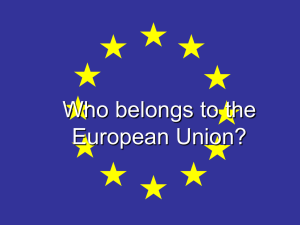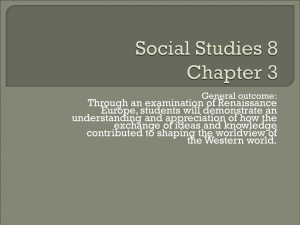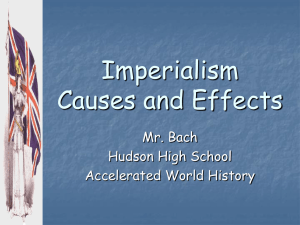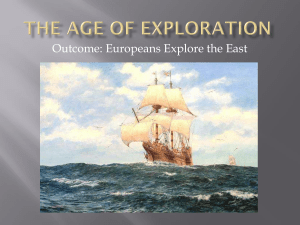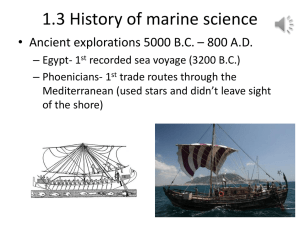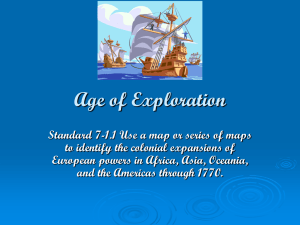SS8U1L11aAnswer_Key_1
advertisement
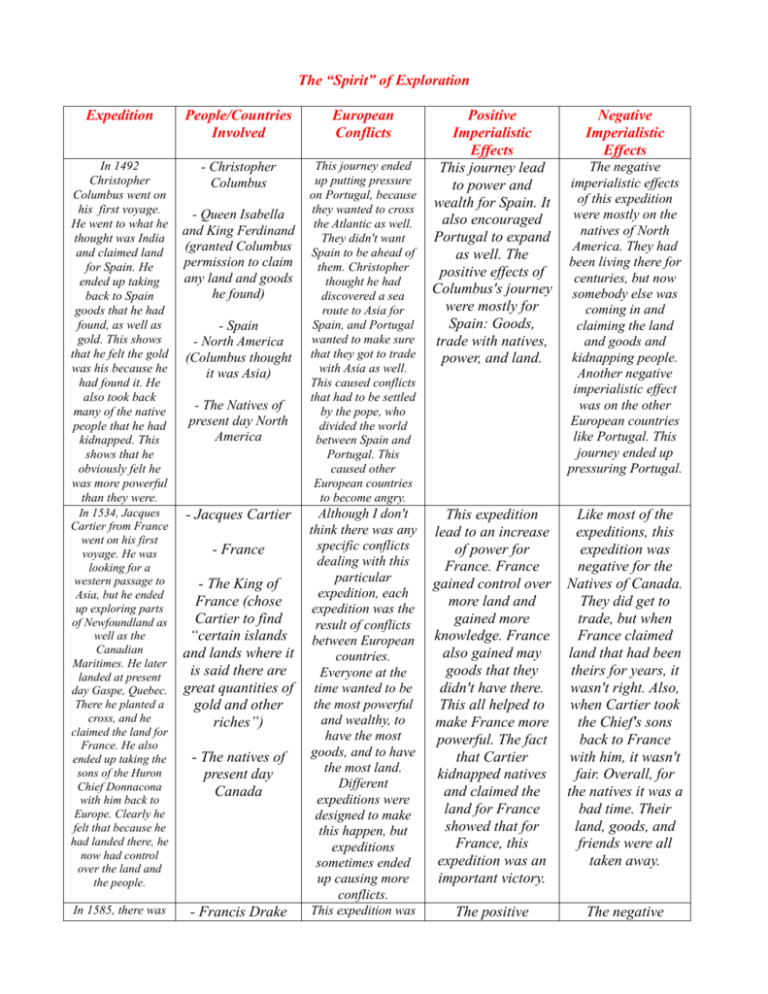
The “Spirit” of Exploration Expedition People/Countries Involved European Conflicts In 1492 Christopher Columbus went on his first voyage. He went to what he thought was India and claimed land for Spain. He ended up taking back to Spain goods that he had found, as well as gold. This shows that he felt the gold was his because he had found it. He also took back many of the native people that he had kidnapped. This shows that he obviously felt he was more powerful than they were. In 1534, Jacques Cartier from France went on his first voyage. He was looking for a western passage to Asia, but he ended up exploring parts of Newfoundland as well as the Canadian Maritimes. He later landed at present day Gaspe, Quebec. There he planted a cross, and he claimed the land for France. He also ended up taking the sons of the Huron Chief Donnacona with him back to Europe. Clearly he felt that because he had landed there, he now had control over the land and the people. - Christopher Columbus This journey ended up putting pressure on Portugal, because they wanted to cross the Atlantic as well. They didn't want Spain to be ahead of them. Christopher thought he had discovered a sea route to Asia for Spain, and Portugal wanted to make sure that they got to trade with Asia as well. This caused conflicts that had to be settled by the pope, who divided the world between Spain and Portugal. This caused other European countries to become angry. In 1585, there was - Queen Isabella and King Ferdinand (granted Columbus permission to claim any land and goods he found) - Spain - North America (Columbus thought it was Asia) - The Natives of present day North America - Jacques Cartier - France - The King of France (chose Cartier to find “certain islands and lands where it is said there are great quantities of gold and other riches”) - The natives of present day Canada - Francis Drake Although I don't think there was any specific conflicts dealing with this particular expedition, each expedition was the result of conflicts between European countries. Everyone at the time wanted to be the most powerful and wealthy, to have the most goods, and to have the most land. Different expeditions were designed to make this happen, but expeditions sometimes ended up causing more conflicts. This expedition was Positive Imperialistic Effects This journey lead to power and wealth for Spain. It also encouraged Portugal to expand as well. The positive effects of Columbus's journey were mostly for Spain: Goods, trade with natives, power, and land. Negative Imperialistic Effects The negative imperialistic effects of this expedition were mostly on the natives of North America. They had been living there for centuries, but now somebody else was coming in and claiming the land and goods and kidnapping people. Another negative imperialistic effect was on the other European countries like Portugal. This journey ended up pressuring Portugal. This expedition lead to an increase of power for France. France gained control over more land and gained more knowledge. France also gained may goods that they didn't have there. This all helped to make France more powerful. The fact that Cartier kidnapped natives and claimed the land for France showed that for France, this expedition was an important victory. Like most of the expeditions, this expedition was negative for the Natives of Canada. They did get to trade, but when France claimed land that had been theirs for years, it wasn't right. Also, when Cartier took the Chief's sons back to France with him, it wasn't fair. Overall, for the natives it was a bad time. Their land, goods, and friends were all taken away. The positive The negative war between Spain and England. Francis Drake from England, the first Englishman to circumnavigate the globe, sailed out to the new world and robbed the ports of Santo Domingo and Cartegena. On his way back, he captured a Spanish fort in Florida. His attacks brought wealth to England, which was one of the main goals at the time: Explore in order to gain power, wealth, land, and goods. Drake was an explorer, but this particular expedition helped England's imperialism. Five years after Christopher Columbus's voyage, the Portuguese explorer Vasco da Gama led an expedition around Africa, across the Indian Ocean, and to the city of Calicut. Da Gama had established a sea route around Africa to the East, and he came back to Portugal proudly, with many precious spices. - Queen Elizabeth I (gained respect for Drake and dubbed him a knight) - England - Spain - Vasco da Gama - Portugal a direct result of conflicts between Spain and England. These conflicts happened for the same reason as all the others: Every European country was trying to outdue the others in trade, wealth, land, goods, and power. This of course lead to fighting. Drake robbed the Spanish ports because of these conflicts, because England wanted the treasure. As well, this expedition caused even more, bigger conflicts between England and Spain. imperialistic effects imperialistic of this expedition effects of this were for England. expedition were for This expedition Spain. When Spain lead to more power was robbed, it no and wealth in doubt lost some England, which power and wealth. was one of the main This expedition goals of was designed to be imperialism in the bad for Spain and first place. to increase Although Drake England's power, was considered a and it did work. pirate by the Eventually, Spanish, he was a England defeated hero to the English. Spain. At the time, every European country was trying to be the best, so discovering the sea route to the East was a good advantage to Portugal. It helped Portugal become more powerful, which was the goal of most expeditions. Of course, all countries in Europe wanted the same thing, so naturally this lead to conflicts. The positive imperialistic effects of this expedition is that Portugal gained power, trade, and goods, which was a good thing for Portugal. Portugal didn't gain any power over specific areas, but this expedition did help Portugal to become more powerful, which would help with imperialism later on. Now it is time to express an opinion….. The negative imperialistic effects of this expedition were for the other European countries, because all the countries wanted to establish the route. When Portugal did it, other countries would have lost some power. In paragraph format, respond to the following questions. 1.What elements of the Renaissance worldview allowed some Europeans to treat Indigenous peoples the way they did? There were many elements of the Renaissance worldview that allowed some Europeans to treat Indigenous peoples the way they did. Europeans felt that they were superior to others, and that Indigenous peoples were “savages”. Europeans felt that when they discovered land, it belonged to them, and they didn't realize that Indigenous peoples had been there long before them. Another element is that Europeans were constantly trying to be the most powerful and the most wealthy, which meant that they explored and “conquered” many places. Overall, the main thing that made some Europeans treat Indigenous peoples the way they did is that some Europeans felt that they were superior, and that the Indigenous peoples could easily be controlled. 2. Are there examples of modern day Imperialism? Choose one and explain how it compares to the Imperialism that grew out of expansionism in Europe. I feel that there are examples of modern day Imperialism. The USA is one example, because America has fought wars against Iran and Iraq because they want the valuable crude oil in the gulf. They have also established military bases in Afghanistan which has given America good trade routes for crude oil, and a base to invade Iraq and defeat its President, Saddam Hussein. This compares to the Imperialism that grew out of expansionism in Europe because in Europe, countries wanted to extend their land, power, and resources, and this eventually led to them taking over different places in order to accomplish this. This can be compared to America because the Americans want the crude oil that they don't have, and this eventually leads to them fighting wars with and actually trying to take over oil filled countries like Iran and Iraq. 3. Take a stand!! Do you think that the world is better or worse off because of Imperialism? Provide examples to support your thoughts. I think that for many people, the world is worse off because of Imperialism. For example, the natives that lived in Canada and other places visited by European explorers, were suddenly taken over by them. This wasn't fair to them because for years before they had their own ways of doing things, and it was suddenly changed. Not only that, but their land and resources were taken away from them as well. Imperialism today is also a terrible thing, because people have their own ways of living, and when someone tries to change that and take over, it can be a very difficult thing. Imperialism only benefits the strong and powerful people, but the weak and poor people lose out. It has been this way since the European explorers came to new lands and decided that it was now theirs'. Although for some people and countries Imperialism is a good thing, I feel that Imperialism is unfair for many other people.

